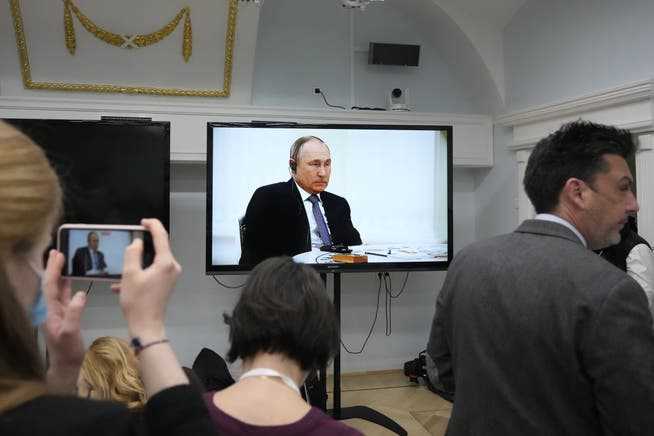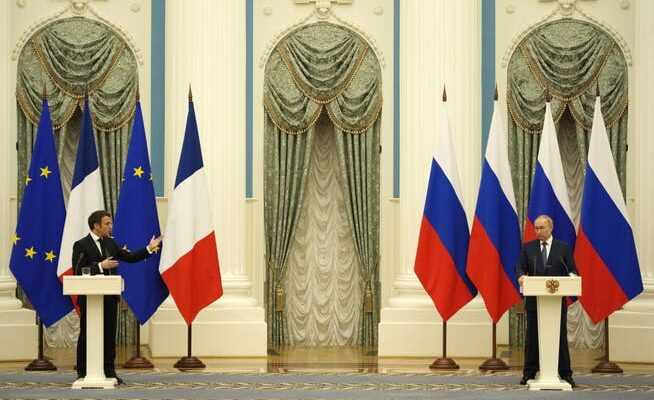The Kremlin is undeterred by the West’s diplomatic efforts to de-escalate the situation in Ukraine. President Putin insists on his goals. That doesn’t mean there has to be a war.
Presidents Emmanuel Macron and Vladimir Putin at the Kremlin press conference after their five-hour talks.
French President Emmanuel Macron did not receive any guarantees on Russia’s behavior in Moscow, said Dmitry Peskov, President Vladimir Putin’s spokesman, after the guest’s departure. Reaching an agreement with France on questions of European security is not at all possible: After all, the USA is the leading nation in NATO and not European countries.
Peskov commented on Macron’s satisfaction with the first steps towards de-escalation in Ukraine and thus corrected France’s self-image: The Kremlin only sees the Americans as really equal negotiating partners. Incidentally, however, it also becomes clear that Putin was not interested in the same thing as his guest. Russia can de-escalate when it has achieved something substantial. The willingness to continue to tighten the screw if it were not the case has not suddenly disappeared just because the French President was visiting.
Putin feels strong enough
At the press conference with Macron, Putin once again made it unmistakably clear how serious he is about the demands for security guarantees and how unsatisfied he has been with the West’s response so far. If he says that all Russian proposals submitted in December are acceptable, that may be a negotiating tactic. But it also confirms that Moscow is not bluffing. It no longer wants to accept the freedom to choose alliances as long as it conflicts with its own interests, and it wants to ensure that NATO withdraws as far as possible from the Russian borders. Comprehensively negotiating arms control mechanisms, which Washington would be willing to do, is not enough for the Kremlin.
Putin now sees the moment as showing the West that the time for condescending to Russia and neglecting Russian security interests is definitely over. Russia feels militarily strong and morally superior. The threat of severe economic sanctions is less chilling for the leadership than the West believes; she feels armed against it. Given the repression of any political and social opposition not tolerated by the Kremlin over the past 12 months, she would also quickly deal with domestic resistance.
The demonstratively close relationship with China serves as a reassurance. This carries even more weight than the Warsaw Pact, says Alexander Baunow from the Moscow Carnegie Center. Russia, he writes in a comment, is not conducting the negotiations like a country that is going to war, but like one that can afford it if the worst comes to the worst.

Journalists in the Kremlin follow the start of talks between Vladimir Putin and Emmanuel Macron.
The deployment of troops under the guise of a huge maneuver aimed at pinching Ukraine seems to serve this purpose. The very military deployment of personnel and material thousands of kilometers from the Pacific to Belarus is a military demonstration to the West. Macron’s travel diplomacy didn’t change that, recent data shows.
«Minsk» or war
The Russian Foreign Ministry and the state media make fun of the nervousness this is causing in America and Europe. But this uncertainty is part of the pressure intended to force the West to act. The primary aim is to finally block Ukraine’s path to NATO. The obligations under the 2015 Minsk Agreement are difficult for the Kiev government to digest. With the threatening backdrop, however, the pressure on the West is now also growing to bow to the agreement.
Macron seems to have understood that for Putin this means: “Minsk” or war. To do this, Ukrainian President Volodymyr Zelenskiy would actually have to agree to painful steps: The government should enter into direct talks with the separatists, the reintegration of the breakaway areas according to the order of holding elections provided for in the agreement, which is extremely disadvantageous for Kiev, and regaining control over Territories and border sections agree and grant the Donbass a special status with a say in state-level issues.
This is likely to severely shake domestic political stability, with unforeseeable consequences. The weakened Ukrainians had to sign the Minsk Agreement in 2015 for the sake of peace. Now Moscow holds it as a trump card – to tame Ukraine once and for all, ideally without additional military force.
Dangerous overconfidence
If Russia sees no will in Zelensky and no willingness on the part of the West to influence Kiev, military options would be available, either with the aim of expanding the territories of the “People’s Republics” or installing a new leadership in Kiev. The price for Russia would be unforeseeably high, and the country is a long way from war euphoria. A war would by no means increase Russia’s security, which the Kremlin sees threatened under the current European security order.
Whether the Kremlin shares this view is unknown. The danger is that Putin and his closest entourage, consisting of allies with an intelligence and military background, will obey a different logic, have a completely distorted image of Ukraine and expect easy success: as if a majority of the population had been waiting for Russian liberators. Before underestimating this warn now also former officers of the military secret service.
Putin also wants to conduct negotiations. Whether he would agree to what Macron, German Chancellor Olaf Scholz and Polish President Andrzej Duda demanded “Substantial dialogue on security on the European continent” will depend on Ukraine’s steps and how long its patience lasts.
